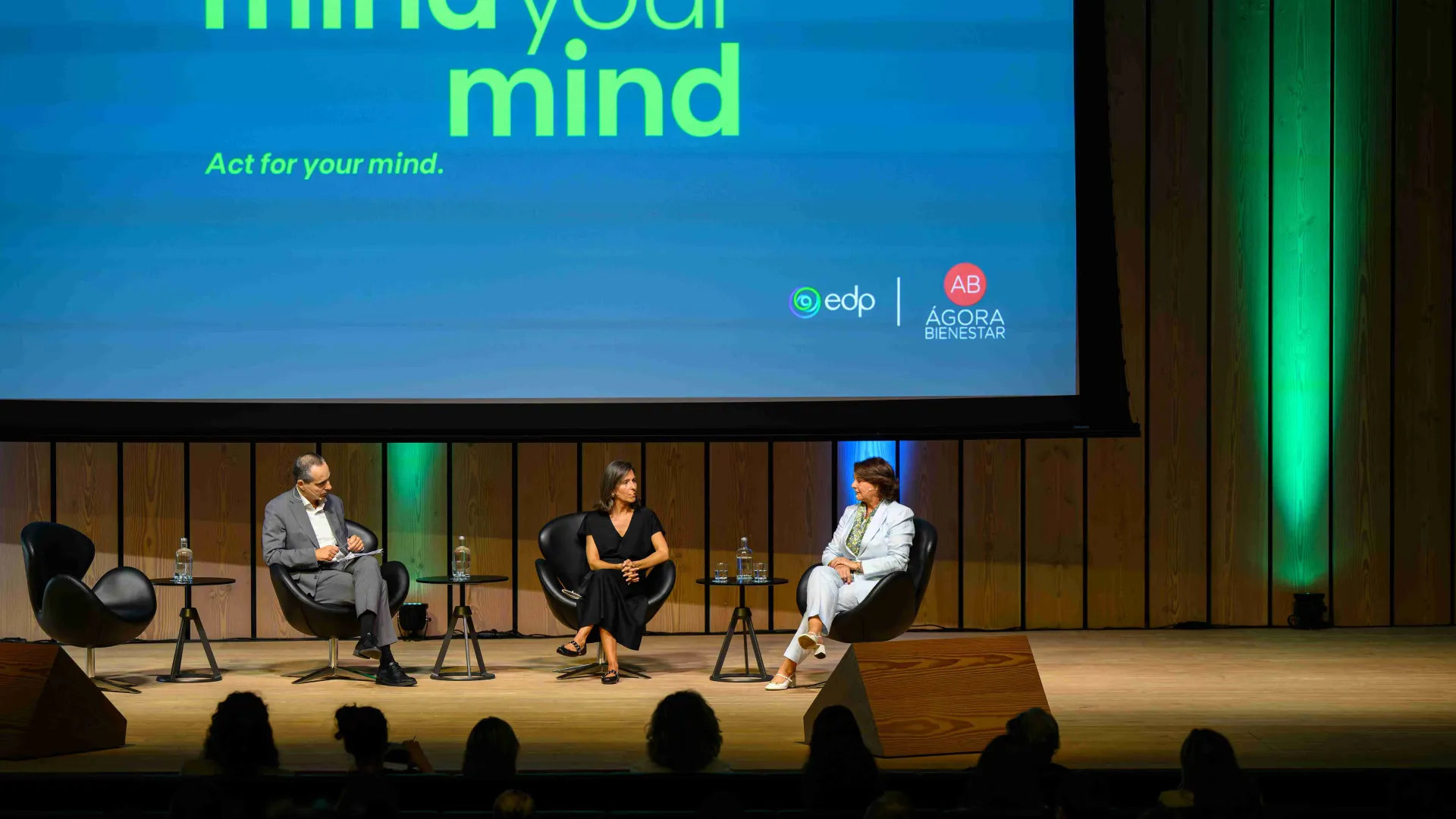
Creating healthier workplaces: how EDP promotes mental health and well-being
Well-being starts with people, and mental health in the workplace resonates far beyond company walls. The most effective organisations aren’t just talking about well-being, they’re listening, adapting, and acting every day to support real lives and ambitions. As highlighted by this year’s Mind Your Mind campaign, success depends on fostering a shared culture where boundaries, kindness, and authentic leadership come to life. At the “Act for Your Mind” Summit, Paula Carneiro, Head of Global People & Organizational Development at EDP , reminded us to “keep the dialogue going and this proximity these days with all the challenges, with having to embrace a hybrid workforce that soon will have agents and AI working alongside employees. I think we need to embrace that Humans need to be open and care about each other, because I'm not sure if the machines will. And to create safety networks so that we can support each other in the work environment.“
Supporting mental health in the workplace is increasingly seen as a shared responsibility and a guide for building work environments that are ethical, innovative and supportive. At EDP, we are guided by the belief that everyone deserves to feel heard and valued, and our ongoing efforts are continually shaped by employee feedback, international research, and lessons learned through collaboration.
That's why this year’s Mind Your Mind campaign arrives with renewed momentum. Inspired by honest feedback, international research and shared experience, we’re acting together to make workplace well-being more tangible for all. By encouraging every colleague to recognise and welcome their emotions, rather than brush them aside, the campaign continues to nurture environments where people genuinely feel heard and supported.
Ana Moniz, business psychologist and featured speaker at the “Act for Your Mind” Summit, delves into what truly works for individuals, leaders, and organizations when building a healthier workplace.
1. How can companies create an environment that builds emotional literacy for all?
First we need to evolve - and we are doing it - to an atmosphere and a culture where people respect each other, and people can be aware of their emotions and the way they impact others. Another very important emotion we need at work is to manage our shame, because if we feel shame, we are not going to intervene in the meeting room. Summing it up, in the workplace, learning how to deal with anger and managing our shame is critical, so we can have psychological safety.
2. What makes setting boundaries in the workplace so difficult, especially for high performers?
In psychotherapy, when I work with someone on this, we focus on learning to say no. The main challenge is that many people with very successful careers don’t feel they have the right to set boundaries. We all need to learn how to establish boundaries and manage others’ expectations. When leaders do this, they make it easier for everyone else to do the same. But it’s definitely not easy — it’s hard work.
3. In practice, how does a company culture shape individual behaviour at work?
If you want to change a person's behaviour, culture is very powerful doing so. For example, if you don't give feedback, because you are not comfortable giving feedback, but every Monday morning you have a feedback meeting, after one month you give feedback, it's fine for you. So cultures can shape behaviours - there is power there. When? When you have good role models.
4. What is the practical value of flexibility for well-being at work?
I would say flexibility [in the work environment] is really good. It’s a good sign of mental health, and it’s very good that we have flexibility. That means people need to know what they need, because people need people. The other thing is that our body needs movement. If I can stay at home, working from home, and it makes sense for me, I need to know that I need time to exercise - to get the rain, get the sun… things like this. Sometimes it is more challenging for people. But I really see flexibility as a very good thing, because it’s not even about work-life balance; it’s really about integration.
5. What do you see as the impact of multitasking on workplace well-being?
Everyone is multitasking - but it’s not really working for everyone. We’re actually less intelligent when we multitask; it should be reserved for simple, routine tasks. It’s not good for us. For example, we all need to set boundaries around notifications. If you’re doing something that requires critical thinking, you can’t afford constant interruptions - you need at least 20 minutes of focus, and that’s hard to get when everything is competing for your attention. What I notice about the new generation is that they want to live more multidimensional lives - not just work. And I find that wonderful. They’re learning to balance things, and they tend to have greater emotional literacy. I believe they know themselves better - because someone took the time to teach them.
According to the recent McKinsey Health Institute report, "Thriving Workplaces: How Employers Can Improve Productivity and Change Lives", the most successful, future-facing companies are those embedding well-being into every layer of their culture, not just with programmes, but through leadership, policies and daily behaviour. McKinsey’s global survey of more than 30,000 employees in 30 countries reveals that 87% of companies in 2025 have a formal wellness programme in place (up from 61% in 2020), and 72% of employers identify employee well-being as a top strategic priority. Moreover, wellness-focused companies report a 24% higher employee satisfaction rate and significantly improved retention and productivity, demonstrating that investing in employee health is not only a moral imperative but also a strategic advantage.
The foundations of well-being within any organisation are closely tied to ethics: an ethical culture provides trust, fairness and psychological safety, which are essential for mental health. As Rita Sousa, Global Head of Ethics & Compliance at EDP, stressed at the “Act for Your Mind Summit”: “We might have a robust code of ethics, and leaders who support that code, but in the end, this is something everyone must own. The principles of ethics start with each of us.” Building a genuinely supportive and ethical workplace also means fostering “speak up” cultures, where real feedback shapes decisions and there’s space for constructive conversations. As Rita Sousa pointed out, “Leadership is fundamental, and employee well-being is a strategic pillar for sustained performance. But for leaders, it’s not enough to have the right codes and rules. Change has to come by example. There must be real coherence between what leaders say and what they do”.
True leadership, as summed up by Rita Santos, is about coherence, courage and commitment to people, qualities that foster environments where trust, dialogue, safety and well-being genuinely thrive.
What defines our company journey is the willingness to listen, to learn, and to keep improving, so that well-being is something we live, not merely pursue. Across EDP, and among other leading companies worldwide, the path forward is clear: building trust through acts of kindness, dialogue, and psychological safety; normalising the “right to disconnect”; supporting flexible and hybrid models for every career stage; and prioritising proactive, ongoing support over reactive, quick fixes. Recent workplace statistics confirm: 81% of workplaces have increased their focus on mental health since the pandemic, but only 13% of employees feel comfortable discussing mental health issues openly. The organisations seeing the most benefit are those breaking down barriers and enabling honest, judgment-free communication.
Real impact comes when initiatives are shaped by the people who use them. This year's Mind Your Mind campaign has evolved through close listening to employee stories - supported by data from our well-being survey and partnered research on how organisations can champion mental health - which highlighted what matters most: accessible support, a culture of daily self-care, and the knowledge that every voice matters. This collaborative approach led to new initiatives tailored to address everyday realities and evolving needs.
What can workplaces do? We’re sharing practical steps and resources for all:
- Local and digital mindfulness workshops: “Pause. Breathe. Refocus. Act for your mind.” (Find sessions in cities worldwide)
- Well-being open days and support lines across regions
- Flexible work options for all generations
- Resources and guides for setting personal and professional boundaries
- Confidential psychological support lines and health benefits are available globally
Discover more by exploring our practical benefits here.
Mind Your Mind 2025 is more than an internal campaign; it is a call to move beyond intention and embrace meaningful action. Every single voice, every act of kindness, every honest conversation, every role model makes a difference. At EDP, and beyond, this is how we build workplaces where people, and potential, can flourish. For us, well-being is never just an idea. It’s who we are. And when we build a culture of care and courage, everyone benefits.






